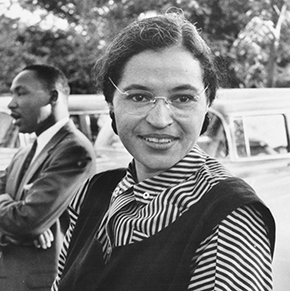Women’s History Month: Rosa Parks
 One wouldn’t expect such an inflamed reaction for sitting on the bus after a long day, but Rosa Parks did just that—and was arrested for it because she refused to give up her seat in the “colored section” of a bus to a white passenger. Her activism in the civil rights movement, however, began long before that. After her marriage to Raymond Parks, Rosa Parks became involved with the local NAACP, eventually becoming a secretary at the Montgomery office. Her experience of nearly being sexually assaulted by her white male neighbor led her to fight for black men’s rights against false accusations and lynchings, as well as black women’s rights related to sexual violence. As the secretary, she investigated the gang rape of Recy Taylor, ( a case that has recently resurfaced, and was most recently recounted by Oprah) and Gertrude Perkins’s rape by two white police officers. Parks formed the Committee for Equal Justice, who’s activism work on anti-rape initiatives helped launch the modern day Civil Rights Movement.
One wouldn’t expect such an inflamed reaction for sitting on the bus after a long day, but Rosa Parks did just that—and was arrested for it because she refused to give up her seat in the “colored section” of a bus to a white passenger. Her activism in the civil rights movement, however, began long before that. After her marriage to Raymond Parks, Rosa Parks became involved with the local NAACP, eventually becoming a secretary at the Montgomery office. Her experience of nearly being sexually assaulted by her white male neighbor led her to fight for black men’s rights against false accusations and lynchings, as well as black women’s rights related to sexual violence. As the secretary, she investigated the gang rape of Recy Taylor, ( a case that has recently resurfaced, and was most recently recounted by Oprah) and Gertrude Perkins’s rape by two white police officers. Parks formed the Committee for Equal Justice, who’s activism work on anti-rape initiatives helped launch the modern day Civil Rights Movement.
The Montgomery bus boycott, which was a planned mission, elevated her status as the face of the movement. Utilizing her reputation as a married, stable, employed and dignified citizen, her case was moved through the Alabama courts. In the mean time, for 381 days, the black community of Montgomery boycotted the bus system, crippling the transit company’s finances until they agreed to hire black drivers and allow seating on a first-come, first-served basis. Eventually, she moved to Detroit and fought racial injustice there within the housing, school and prison systems. She went on to found the Rosa Parks Scholarship Foundation, the Rosa and Raymond Parks Institute for Self Development, and serve on the board of Planned Parenthood. She passed away in 2005, a symbol of nonviolent protest.
